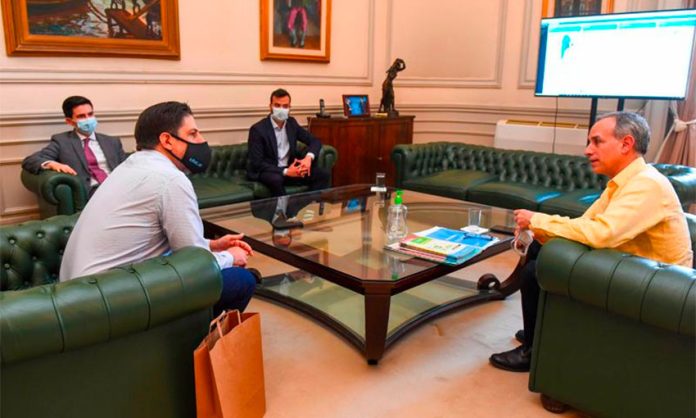Mystery surrounds Mexico’s apparently imminent approval of Russia’s Sputnik V Covid-19 vaccine.
A day after President López Obrador said that Russia had agreed to send 24 million doses of the two-shot vaccine to Mexico, a senior health official announced Tuesday that the first 200,000 doses would arrive next week.
On Tuesday night, Deputy Health Minister Hugo López-Gatell, Mexico’s coronavirus point man, spoke of an approval process for the Sputnik vaccine that the Associated Press (AP) said “sounded like a Cold War spy thriller”and may not invite confidence in the shot.
The deputy minister said that a new medications technical committee had recommended approval of Sputnik V and that Cofepris, Mexico’s health regulator, only lacked “some details” to give it the green light.
“The technical part, the main part of Cofepris, particularly the committee on new medications, has given a favorable recommendation to authorize, that is to say, the crucial part has been solved,” López-Gatell said.
He also said he had not had access to the results of phase 3 trials despite speaking with Russian officials about the Sputnik vaccine over a period of weeks. Vaccine trial results, indicating efficacy and safety, are normally published in international medical journals but Russian authorities have to date only published limited data about the Sputnik V on the vaccine’s own website.
Russian officials have given conflicting accounts about the Sputnik vaccine, AP reported, increasing its supposed effectiveness to higher levels whenever a United States-made Covid-19 vaccine publishes its results.
As there was no data on the Sputnik vaccine published in journals, President López Obrador dispatched López-Gatell to Argentina, which has approved and is using the Russian vaccine, to see what he could find out about it.
According to AP, officials in Argentina had to call their counterparts in Russia to get permission to share confidential files on the Sputnik shot with Mexico.
Although López-Gatell said he hadn’t been able to get his hands of phase 3 results, AP said that the Argentines gave him a copy of them. The deputy minister apparently then submitted the results and other Sputnik data to Cofepris for the purpose of approving the vaccine, which Russia says is 91.4% effective.
But although the Cofepris technical committee recommended approval it turns out the vaccine application hasn’t even been formally filed yet, AP said.
![]()
“Mexican authorities apparently can’t grant authorization based on what may be a sheaf of photocopies from who-knows-where obtained through back channels,” the news agency said.
López-Gatell said Tuesday that the government is currently attempting to get Russian officials, who may have scant experience dealing with pesky regulators, to designate a person to formally submit a vaccine approval application that appears to have already been rubber stamped. (López Obrador said last week that approval was imminent and health officials have said much the same.)
That Mexico desperately needs access to more vaccines is unquestionable – the nation’s death toll passed 150,000 this week – but it remains to be seen whether there will be sufficient public confidence in the Sputnik V shot to make its purchase worthwhile – provided it is as effective as the Russians say it is.
National Action Party (PAN) Senator Xóchitl Gálvez questioned why the federal government is purchasing the Russian vaccine over others that are available and more widely trusted.
“The important thing is to save lives … [but] why buy a vaccine that doesn’t yet have the backing of the international scientific community, the World Health Organization or the U.S. Food and Drug Administration,” she wrote on Twitter.
“I do want vaccines, but ones that have been approved by the World Health Organization and the international scientific community,” tweeted Senator Lilly Téllez, who also represents the PAN. “The Russian vaccine does not have that yet. It is the cheap vaccine, that is why the government chose it.”
Mexico also has agreements to purchase the Pfizer/BioNTech, AstraZeneca/Oxford University and CanSino Biologics vaccines. However, it has so far only received shipments of the Pfizer shot, which has been used to vaccinate frontline health workers.
More than 652,000 doses had been administered as of Tuesday night, leaving Mexico with around 114,000 unused ones. No further shipments of the Pfizer vaccine are expected until the middle of February because the pharmaceutical company is upgrading its Belgum plant while the AstraZeneca and Cansino shots likely won’t arrive before March.
Meanwhile, Mexico’s coronavirus case tally and Covid-19 death toll continue to climb at a rapid rate. The Health Ministry reported 17,165 new cases on Tuesday, pushing the accumulated tally to just under 1.79 million while the death toll rose by 1,743 to 152,016.
Source: AP (en)
